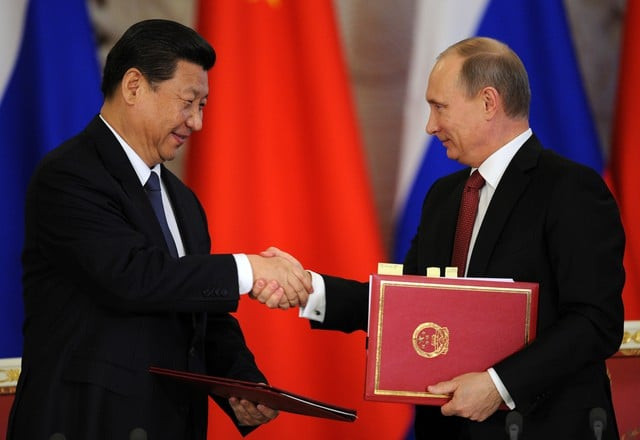Russia, China favour taking Taliban off UN sanctions list
Tripartite meeting in Moscow voices support for Afghan-led peace process

Chinese President Xi Jinping meets Russian Prime Minister Vladimir Putin. PHOTO: REUTERS
The announcement came in a joint statement issued after the trilateral meeting involving senior officials from Pakistan, Russia and China. The three-way talks that discussed the current situation of Afghanistan were held in Moscow on Tuesday.
Tripartite talks warn of emergent Islamic State threat in Afghanistan
Interestingly, Afghanistan was not part of the discussions, causing concerns in Kabul. The joint communique, however, said all the three countries agreed to proceed with consultations in an expanded format and would welcome the participation of Afghanistan.
The most significant takeaway of the Moscow meeting was Russia and China’s announcement to show a ‘flexible approach’ to delisting Afghan individuals from the UN sanctions lists as their contribution to the efforts aimed at launching peaceful dialogue between Kabul and the Taliban.
The participants agreed to continue their efforts towards further facilitating the Afghan-led, Afghan-owned peace and reconciliation process in Afghanistan according to the known principles of reintegration of the armed opposition into peaceful life, the joint statement reads.
It was not immediately clear how Afghanistan’s government and the United States would react to the move by Beijing and Moscow to remove some Afghan Taliban commanders from the UN sanctions list.
Pakistan backed HIA-Kabul talks, says Hekmatyar’s aide
The development, nevertheless, is an indication that both Russia and China are now flexing their muscles to play a more proactive role in the Afghan peace process that could not make any headway due to the current hiccup in ties between Kabul and Islamabad.
The Ghani administration has accused Pakistan of providing sanctuaries to the Afghan Taliban leadership and the Haqqani network. It also asked Islamabad to use force against these groups since Taliban refused to enter into the negotiations.
Pakistan, however, made it clear that it does not harbour any Taliban on its soil and insisted that all-inclusive peace process is the only way forward to achieve lasting peace in Afghanistan.
Observers believe that the outcome of trilateral meeting in Moscow is a major diplomatic success for Pakistan since two big powers—Russia and China—vindicated its stance by supporting the Afghan peace process. More importantly, this also showed increased cooperation between Pakistan and Russia, which during the cold-war era were in opposite camps mainly due to the Afghan conflict.
The trilateral meeting in Moscow also means that Pakistan, Russia and China have now convergence of opinion on how to deal with the long running conflict in Afghanistan, where the Da’ish is also trying to establish a foothold.
Kabul slams tripartite meeting in Moscow
The three-way talks in Moscow minced no words in expressing concerns over what they called the ‘deteriorating security situation in Afghanistan’.
They particularly voiced concern regarding the increased activities of extremist groups, including Da’ish-affiliates in the country.
Published in The Express Tribune, December 28th, 2016.



















COMMENTS
Comments are moderated and generally will be posted if they are on-topic and not abusive.
For more information, please see our Comments FAQ